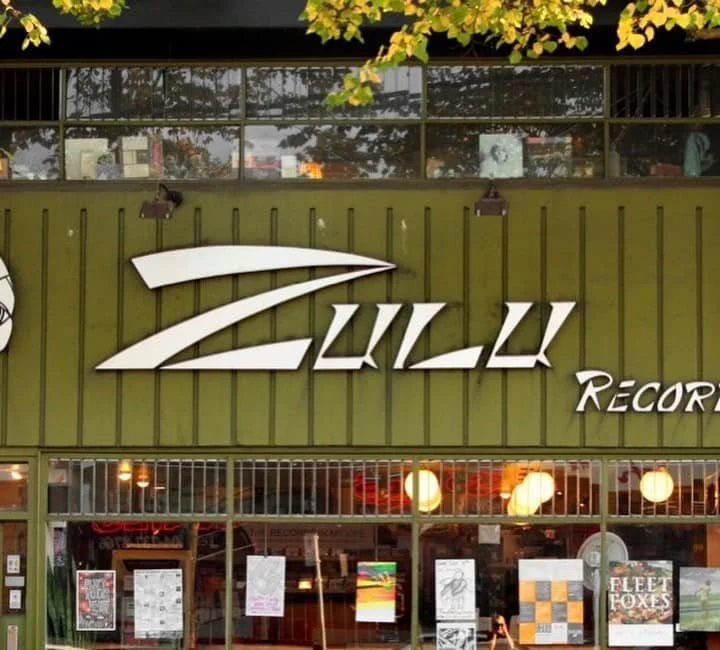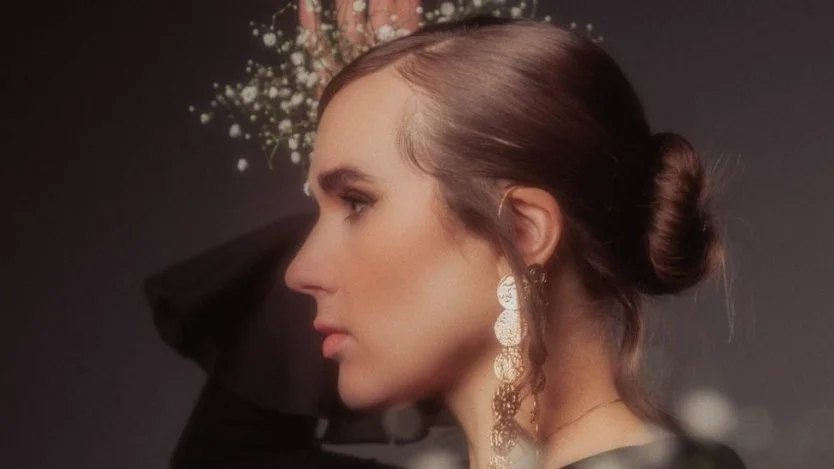Khatsahlano Street Party is a thriving celebration of Vancouver’s creative spirit
The annual West 4th Avenue festival returns, with more than 50 musical acts on seven stages across 10 blocks
Crowd counts at Khats fest have topped 175,000 throughout the day.
Khatsahlano Street Party takes place on West 4th Avenue between Burrard Street and Macdonald Street on July 8 from 11:00 a.m. to 9:00 p.m.
ON JUNE 19, 1973, a three-alarm fire broke out at Vancouver’s King Edward High School. The building, which had opened in 1905, was completely destroyed, although part of its stone wall was incorporated into an expansion of Vancouver General Hospital, and can still be seen at the corner of West 12th Avenue and Oak Street.
On the same day as the blaze that claimed King Ed, a 10-year-old Grant McDonagh—the future owner of Zulu Records—arrived in Vancouver with his family, via train from Montreal.
These things are unrelated, of course, but they both come up in the conversation when Stir calls McDonagh for an interview on June 19, 2023—exactly 50 years after the events in question occurred.
The nominal reason for this interview is the Khatsahlano Street Party, an event that McDonagh has had a hand in from its first incarnation in 2011. The timing has, however, put the engagingly loquacious Zulu proprietor in a retrospective frame of mind, and understandably so.
“I’m so glad that I got to see Vancouver in the ’70s—and of course the ’80s and ’90s and so on,” he says. “I was the right age at the right time in the right place.”
While his recollections might be coloured by nostalgia, McDonagh remembers an era—long before Vancouver earned its millennial reputation as No Fun City—when there were more civic events and festivals in his adopted hometown, and less regulation and general uptightness.
“I got to see a very loose Vancouver—4th Avenue when it was the laid-back, hippie folk way that it was,” he says. “And that kind of stayed with me because I liked it.”
McDonagh says Khatsahlano is a welcome throwback to those times, a reminder of a civic spirit that somehow survives in spite of the realities of an impossibly inflated real-estate market and an increasingly stark divide between the haves and the have-nots.
For the uninitiated, the Khatsahlano Street Party (initially called the Khatsahlano Music + Art Festival but known popularly as simply Khats) is a one-day event that takes over 10 blocks of West 4th Avenue between Burrard Street and Macdonald Street, showcasing the neighbourhood and its merchants and putting the spotlight on local musical acts, both up-and-coming and established.
Over the years, Khats has played host to just about everyone who has made a mark in the Vancouver music scene in recent memory, including (and this is just a short list) Rich Hope, Peach Pit, Mode Moderne, the Pack a.d., Brasstronaut, the Zolas, Hey Ocean!, the Boom Booms, Old Man Canyon, ACTORS, Devours, Gold & Youth, No Sinner, Portage & Main, the Gay Nineties, and the Ballantynes. And that’s not even counting the “legacy acts” like D.O.A., Bif Naked, Pointed Sticks, Slow, Veda Hille, or the Evaporators.
West 4th vinyl institution Zulu Records.
Louise Burns is a Khats veteran, having performed at the fest in 2011, 2015, and 2017. She’ll be doing it again this year, taking to the Burrard Stage at 6:30 pm on July 8. She tells Stir that playing the first edition of the festival was “pretty special”.
“You could feel the energy and excitement, being such a new and massive celebration of Vancouver music,” she recalls. “I called my backing band the Sad Dads or Sad Bastards or something and I felt pretty good about that, too. I’ve played it twice and it never gets old knowing you are playing to so many people, even if some of them are just wandering by looking for a burrito or whatever.”
Precisely how many people Khatsahlano attracts every year is hard to say. Because it is a free event that takes place on the street, there is no way to get a precise count. That hasn’t stopped organizers from trying, of course, as West 4th Avenue Business Improvement Association executive director Jane McFadden tells Stir in a separate interview.
Louise Burns. Photo by Mark Miller
“Last year we had a drone go over top many, many times, so we blew up some of those photos and did counts,” she explains. “It’s hard to guesstimate. We said 175,000 for sure, but it ebbs and flows throughout the day.
“Many families come for the daytime and then they go drop off their kids and come back. We see that often. Or people stay all day in one beer garden. They don’t leave that spot. Or they stay in front of that particular stage. So it’s hard to say, but I think a couple hundred thousand attend, for sure.”
Whatever the exact number, it is certainly higher than the crowds drawn to Khatsahlano’s immediate predecessor, Kitsilano Hippie Daze, an annual celebration of the neighbourhood’s countercultural heritage rooted firmly in the 1960s. When that event fizzled out, McDonagh brought the BIA a bold new concept. Instead of looking backwards, why not celebrate the artists who are giving Vancouver a creative jolt in the current century?
“The 4th Avenue board at the time went for it, and we went from 10,000 people to 50,000 that first year of Khatsahlano,” says McDonagh.
As the crowds have grown, so has the event itself. In 2011, Khats featured five stages of live music running from 11 am to 6:00 pm. This year’s edition boasts seven stages, and the party doesn’t stop until Yukon Blonde plays the final notes of its headlining set at around 9:00 pm.
The past few years have been trying ones for local arts and musical festivals of all kinds. COVID-19 and its resulting restrictions on large gatherings compelled pretty much all of them to postpone, move to an online-only format, or cancel altogether. Many never returned, and for a while it even looked like the granddaddy of them all, the Vancouver Folk Music Festival, was doomed to be one of the casualties.
Khats was forced to cancel its party plans in 2020 and ’21, but returned bigger and better than ever last summer. How has this event managed to survive and even grow in a time when (as any family that has put food on its table recently could tell you) the economy still hasn’t quite recovered from the impact of a global pandemic?
Khatsahlano has forged partnerships with sponsors and receives some funding from the Province of British Columbia, but at its heart, it remains very much a neighbourhood celebration, paid for in large part by the merchants of West 4th Avenue, who benefit from a massive influx of potential new customers on the day of the event.
McDonagh has never had any doubts about the viability of Khatsahlano; to hear him tell it, he knew right from the start that it would be a winner. “I did anticipate it continuing on, because it was based on a good foundation, which was to support the small businesses of 4th Avenue, but also to support the bands and the arts in Vancouver, which 4th Avenue has such a history of,” he says. “So I think we were coming from a good place. It’s always a difficult marriage—you know, commerce and the arts and so on—but I knew what we were trying to do when it started, and I still feel that we’re able to achieve that.”
For her part, McFadden makes it clear that nothing short of another pandemic lockdown is going to stop this party.
“We would do it even if we had to cut back,” she asserts. “I mean, there’s always options to make it smaller. Don’t do the 10 blocks; do five blocks. So that’s already something that I was thinking about, like post-COVID: ‘I wonder what’s going to happen here?’ Especially given rising costs in all aspects — our fencing, beer cups, everything has gone up, as you know. Just going out to grocery shop it feels like it’s abundantly clear that it’s gone up on all levels.”
One thing that hasn’t gone up is Khatsahlano’s price of admission. The fact that an entire day of top-tier entertainment can be had for no ticket fee whatsoever seems almost inconceivable when you consider how much work goes into it.
McDonagh and his fellow curator Justice McLellan certainly put their share of hours into selecting the musical acts, a task that entailed sifting through more than 600 submissions.
“We spent six to eight weeks listening to submissions, like a little bit here, a little bit there, in the mornings most of the time—for about an hour here, an hour there for many, many mornings,” McDonagh says. “We went through quite a few hundred submissions, plus we had names that were in our mind. I would say initially [in 2011] it was all just like a wish list. There were no submissions; it was just a list of people that we wanted to do it, because it was a curated event. It still is a curated event, but the difference is that as time went on, we opened it to more submissions.”
McDonagh and McLellan have programmed more than 50 acts for this year’s edition, including fast-rising indie-pop darlings Daysormay and veteran scene-maker Stephen McBean’s Pink Mountaintops.
For Burns, July 8 will be a day of catching up with the music scene she holds so dear. “I’ve been living in the studio for the past few years and haven’t gotten out nearly as much as I’d like to, so the fact we can all check out what each other are up to in a single day is brilliant,” she says. “Also, I’ve been calling it Friend Fest 2023. Supporting each other is really important. Our music scene can be kind of icy sometimes and I think Khats is a great way to see how much talent this city actually has.”
Talent, of course, comes in many forms, and when McFadden is asked what she’s most looking forward to at Khatsahlano 2023, she answers without hesitation: “One of my favourite parts is hosting the pie-eating contest at the kids’ stage, so that’s at Trafalgar. We get them little mini tarts from the Pie Hole, and then medium-size pies, and then the regular-size pies. And we do different age groups; the five-year-old pie-eating contest is something you need to see. It’s pretty amazing, with blueberry all over their faces.”
As for McDonagh, his own personal reward for the effort he puts into Khatsahlano is simple and endearing, and it makes it clear that, deep down, he is still that kid from Montreal who fell in love with Vancouver all those decades ago.
“I love seeing people of all age groups get together with smiles on their faces,” he says. “I’m just sort of a middle man, but I feel very good to have helped make this happen, along with the other people. We all feel good from our contribution to it. We all look forward to it. We really feel like we’re offering something that is really worthy.”

















